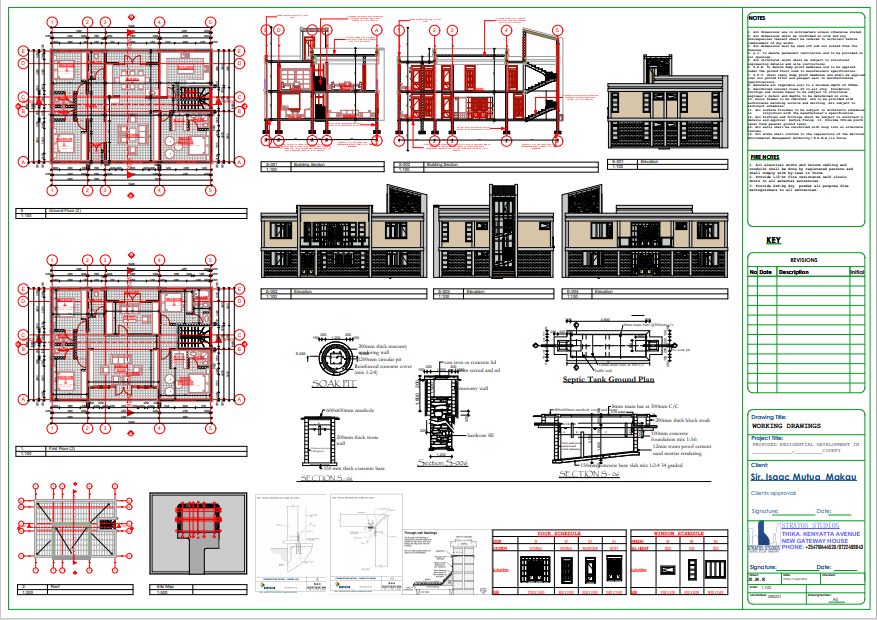Saving money in construction is often discussed from the builder’s side of view rarely is anything is discussed from the client or homeowners side. There are a few ways in which you, the client can save money in building. Building for less doesn’t necessarily mean building to lower standards occasionally it is sometimes possible to shave huge costs without having to impact quality in any way. However, when approached wrong cost-cutting may impact the project negatively and in some instances be catastrophic. We have tried to narrow down key areas where a few bucks can be saved by doing a couple of things different.
1.Plan Ahead.

It might sound counterintuitive however, it’s good to prepare yourself before embarking on a construction project, be it residential or commercial. Speak with friends who have undertaken a similar project and have them share insight. When construction commences, regularly consult your builder or architect to know what the next stage entails, thereby giving you ample time to source for better and more affordable options. This is better than if you were abruptly approached and told a commodity or product is needed. This also allows you to order materials in bulk than if you bought them in small increments.

A professional architectural plan and a Bill Of Quantities are vital when planning for a project. These may be expensive at times but with the rise of websites like House Plans Kenya and many such websites offering complete professional Architectural plans with Bills of quantities and Structural Drawings for a fraction of the regular price, while still offering approvals ad site visits one has no excuse for guess work.

2. Hire Professionals.

Working with professionals eliminates guesswork, for example, hiring a quantity surveyor allows you to accurately understand how much the building will cost and for commercial projects, a quantity surveyor advises on the financial viability of a project. Architects and engineers allow for the best utilization of resources. A good architect will design within a budget and optimize the design to be as effective as possible. Hiring experts also increases longevity and eliminates the need for constant repair. Cheap is expensive, often isn’t always true as some consultants tend to sell overpriced mediocrity, so look for the best value.
3. Time Is Money

For every month that your building isn’t occupied especially for commercial projects, that’s income that you’ve effectively missed out on. For residential projects that could mean paying more at your current residence. The longer the project takes the more expensive it becomes. Equipment gets leased for longer, consultants get paid for longer, some equipment and built structures tend to wear when left exposed to the elements. All this effectively makes the project cost more. Have a goal to build as fast as possible. Also, some areas have a limit on how long you should take to complete your structure, after which you will have to re-apply for approvals again which is expensive. One builder seven days, seven builders one day.
4. Keep Records.

Keeping track of all expenses during construction allows you to tell what’s working and what isn’t, numbers never lie. The recording will also allow you to monitor and have a record of credible suppliers and whom to recontact in future projects. Keeping accounts also enables one to effectively identify underutilized resources.
5. Contracting and Subcontracting.
Depending on the locality, it can be cheaper to source a contractor for certain aspects like plumbing and electrical works than hiring the technicians directly. Contracting offers better quality control. If the architect or inspector notes that an installation isn’t to standard the reinstallation or repair costs incurred are met by the contractor. Contracting most works guarantees better quality control and reduce repair cost during the defect liability period.
6. Purchase in Bulk.

Buying in larger volumes gives you a bigger room to negotiate the price and offsets costs like transport. For materials that can be stored without deterioration and occupying too much space, bulk purchase is advisable. However, having too many materials on-site isn’t recommended as it takes up space and often impedes construction. Maintaining a balance is key.
7. Reuse

Construction does produce a lot of waste, but not all of it is useless. Concrete debris can be used for paving, filling and landscaping alongside broken brick and construction stone. Try and instruct the contractor to reuse as much as possible as this is also environmentally friendly in some instances. We also have a planet to save.
Thanks to Stratos Studios For their contribution.
I love that plan ahead, definitely it’s going somewhere 👍👍… keep it top👍
LikeLiked by 1 person
Great article, now I know how one should plan before starting their construction project.
LikeLiked by 1 person